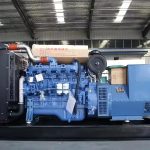Diesel Generators for Transient Response Ensuring Reliable Power Supply in Critical Applications

Introduction
Diesel generators play a crucial role in providing backup power in various industries, institutions, and critical infrastructure facilities. One of the key factors that determine the effectiveness of a diesel generator is its transient response capability. Transient response refers to how quickly and effectively a generator can respond to sudden changes in load demand, ensuring a stable and reliable power supply during transient events. In this article, we will explore the importance of transient response in diesel generators, the factors that influence it, and the strategies to enhance transient response for optimal performance.
Importance of Transient Response in Diesel Generators
In applications where a continuous and uninterrupted power supply is essential, such as hospitals, data centers, telecommunications facilities, and industrial processes, the transient response of a diesel generator is of paramount importance. During transient events, such as sudden load changes or starting of large motors, the generator must be able to quickly adjust its output to maintain voltage and frequency stability. Failure to respond promptly to these transient events can result in voltage dips, frequency fluctuations, and potential equipment damage.
The ability of a diesel generator to provide a fast and accurate response to transient events is crucial for ensuring the reliability and stability of the power supply. A generator with poor transient response may struggle to cope with sudden load changes, leading to voltage and frequency deviations that can disrupt operations and cause downtime. Therefore, optimizing the transient response of a diesel generator is essential to ensure uninterrupted power supply in critical applications.
Factors Influencing Transient Response in Diesel Generators
Several factors influence the transient response of a diesel generator, including the engine design, control system, governor response, and the size of the generator set. Understanding these factors is essential for improving the transient response and overall performance of the generator.
1. Engine Design: The design of the diesel engine plays a critical role in determining the transient response of the generator. Factors such as the size, type, and configuration of the engine, as well as the turbocharging system, combustion process, and cooling system, can affect how quickly the engine responds to changes in load demand.
2. Control System: The control system of the generator, including the governor, voltage regulator, and load-sharing mechanism, plays a crucial role in regulating the output of the generator during transient events. A well-designed control system can ensure that the generator responds quickly and accurately to load changes, maintaining voltage and frequency within acceptable limits.
3. Governor Response: The governor of a diesel generator is responsible for adjusting the fuel supply to the engine to maintain the desired speed and output. A fast and responsive governor is essential for ensuring that the generator can quickly adjust its output in response to transient events, such as sudden load changes or starting of heavy loads.
4. Size of the Generator Set: The size of the generator set, including the power rating and capacity, can also influence its transient response. Larger generators with higher power output may have slower transient response times compared to smaller units. Therefore, selecting the right size of generator set for the application is crucial for ensuring optimal transient response.
Strategies to Enhance Transient Response in Diesel Generators
To enhance the transient response of a diesel generator and improve its performance during transient events, several strategies can be employed. These strategies focus on optimizing the engine design, control system, governor response, and overall system configuration to achieve faster and more accurate responses to load changes.
1. Engine Tuning: Proper tuning of the diesel engine is essential for optimizing its transient response. This includes adjusting the fuel injection timing, turbocharger boost pressure, and air-fuel ratio to ensure that the engine can quickly respond to changes in load demand. Regular maintenance and tuning of the engine are crucial for maintaining peak performance and transient response.
2. Upgrading the Control System: Upgrading the control system of the generator, including the governor, voltage regulator, and other control components, can significantly improve its transient response. Modern digital control systems offer advanced features such as load sharing, droop control, and frequency response adjustment, which can enhance the overall performance of the generator during transient events.
3. Implementing Load Shedding: Load shedding is a strategy that involves shedding non-essential loads in response to transient events to prevent voltage and frequency deviations. By prioritizing critical loads and shedding less critical ones during sudden load changes, the generator can maintain voltage and frequency stability and prevent disruptions in power supply.
4. Parallel Operation: Running multiple generators in parallel can improve the transient response of the system by sharing the load among multiple units. Parallel 400kw diesel generator allows for better load distribution, faster response to load changes, and increased system redundancy, ensuring a more reliable power supply during transient events.

5. Regular Maintenance and Testing: Regular maintenance and testing of the diesel generator are essential for ensuring optimal performance and transient response. Routine inspections, lubrication, fuel system checks, and load testing can help identify and address any issues that may affect the generator's transient response and overall reliability.
Conclusion
In conclusion, the transient response of a diesel generator is a critical factor that determines its effectiveness in providing backup power in critical applications. By understanding the factors that influence transient response and implementing strategies to enhance it, operators can ensure a stable and reliable power supply during transient events. Optimizing the engine design, control system, governor response, and overall system configuration can significantly improve the transient response of the generator, leading to enhanced performance and operational reliability. In an increasingly connected and technology-dependent world, reliable backup power sources such as diesel generators with superior transient response capabilities are essential for ensuring uninterrupted operations and safeguarding critical infrastructure.
